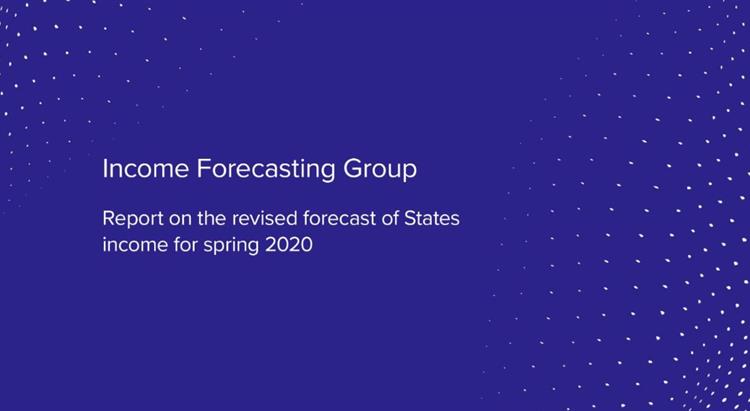27 May 2020

A Government report published today estimates that public revenues in 2020 could drop by £80 million compared to 2019, and not return to pre-Coronavirus levels until 2022.
In autumn 2019, Treasury and Exchequer’s Income Forecasting Group forecast a £25 million rise in public revenues in 2020 (from £850 million to £875 million), with further increases every year to reach £985 million in 2023. But in its latest report the group says that the necessary restrictions imposed to reduce the spread of COVID-19 have had an immediate and significant impact on Jersey’s economy and public finances.
The Income Forecasting Group now predicts that public revenues will be £80 million lower in 2020 than they were in 2019, and £106 million (12.1%) lower than forecast in autumn 2019. Around half of the forecast reduction (£51 million) is due to downgrades to the forecast for income tax, with £20 million from lower GST, £15 million from lower stamp duty, £8 million from reduced impôts, £6m from other income and £6 million from increased provisions for bad debts.
The Income Forecasting Group produced a ‘base-case forecast’, which assumes three months of restrictions on economic activity and a three-month phased return to close to full economic activity, while still not returning to pre-COVID levels.
Tax revenues are expected to grow again in 2021 and beyond, but to remain below 2019 revenues until 2022 and below the levels forecast last autumn until at least 2025.
The new forecast for 2023 is for general revenues to be around £58 million (6%) lower than the autumn forecast, primarily due to a reduction of £35 million in the income tax forecast, with stamp duty £8 million lower, GST £6 million lower and impôts £4 million lower.
The forecasts, which highlight a range of uncertainties, are based on and consistent with the Fiscal Policy Panel’s recent forecast for the economy to be around 5% smaller in the medium term than was previously predicted.
Treasury and Resources Minister, Deputy Susie Pinel said: “The forecasts published by the Income Forecasting Group today make for serious reading. It has been clear since March what effect the Coronavirus pandemic is having on jobs and business, but we can now see the size and duration of the impact that COVID-19 is having on our public finances.
“The report makes clear that our revenues will be significantly reduced this year and next, in particular, and through to at least until 2024, compared with what we expected at the time of the Government Plan. The Government is urgently reviewing our public finances and secured a new £500 million debt facility earlier this month, to ensure that we have sufficient funds to maintain public services and to stimulate the economic recovery.
“The Government’s priorities during this emergency have been the health, wellbeing and livelihoods of Islanders, and the health of the economy, and work is underway to develop measures to stimulate the economy, to get people back to work and businesses trading and investing again.”
The Income Forecasting Group comprises senior Treasury and Economy officials and four independent members. It produces two forecasts a year, which are based on an analysis of a range of Jersey and international economic data.
As well as the impact of measures taken to limit the spread of Coronavirus, other factors highlighted by the Income Forecasting Group include uncertainty regarding the impact of Brexit on Jersey, the impact on financial services of low interest rates and international regulatory measures, Jersey’s low productivity growth and the impacts of Jersey’s ageing population.
The Income Forecasting Group also developed a forecast for a ‘downside’ scenario, which assumes a more prolonged period of restriction on economic activity and more severe impacts on the economy.
Under this scenario, the forecast for general revenues in 2020 is £162 million (19%) lower than the previous forecast, around £100 million of which is due to downgrades to the forecast for income tax.